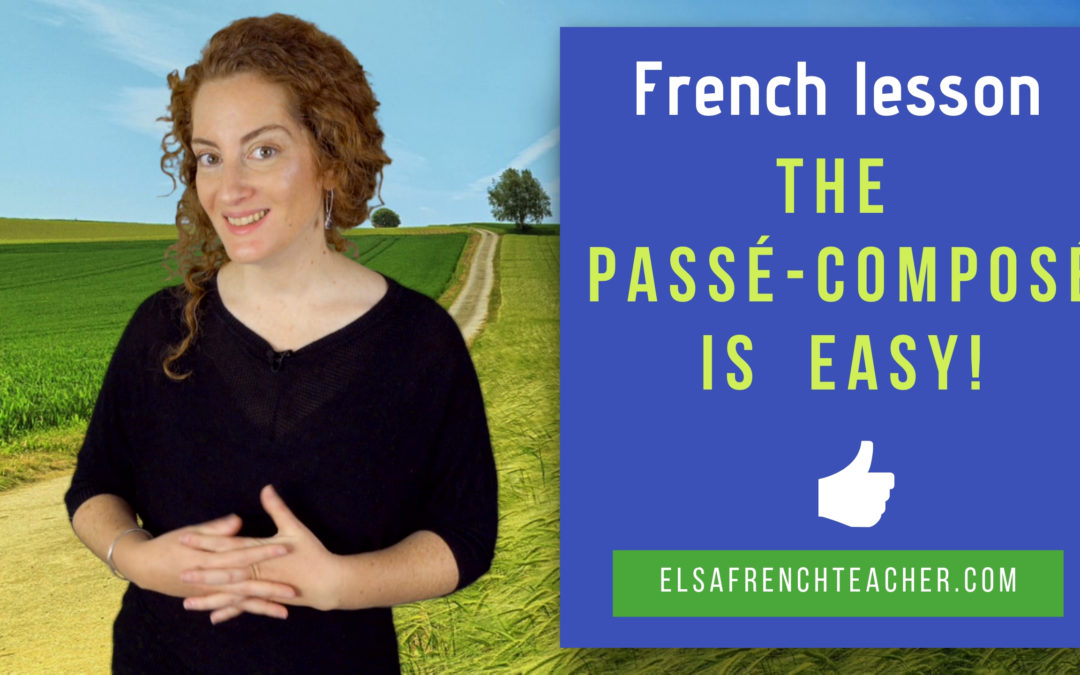
Conjuguer au passé-composé – French lesson – Lecon de francais
Conjuguer au passé-composé – French lesson – Lecon de francais







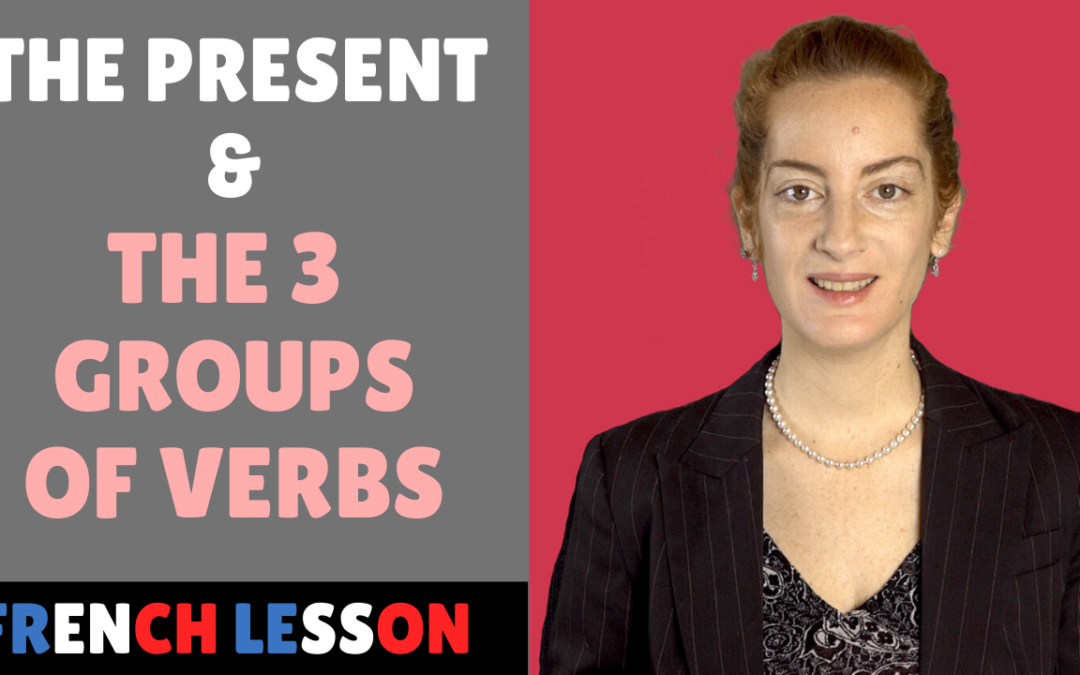



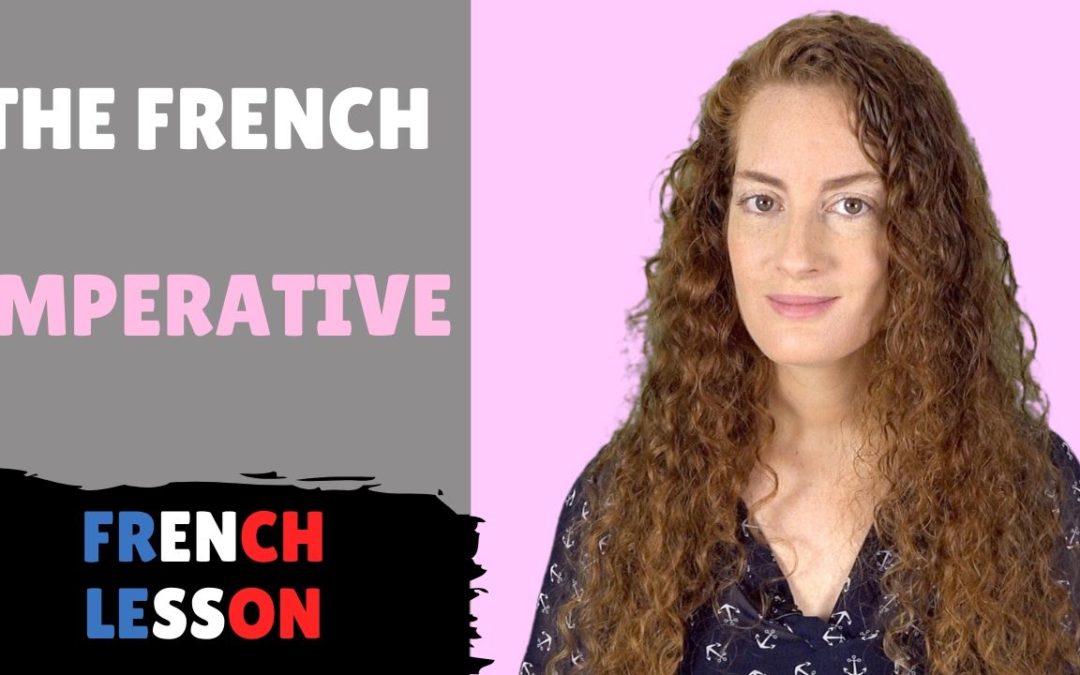
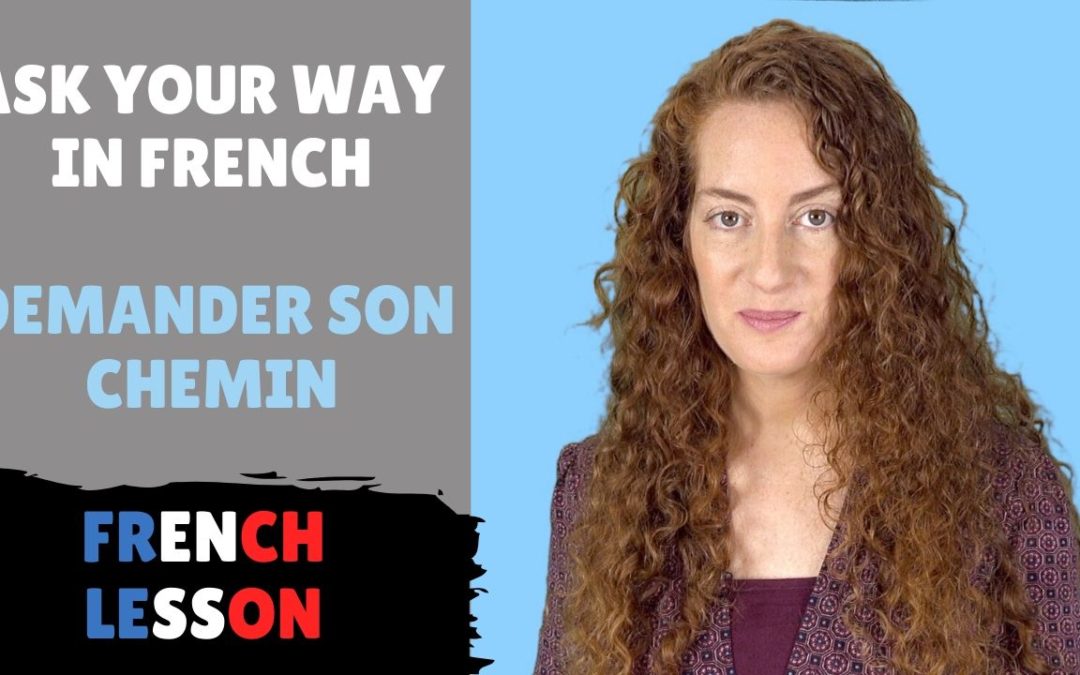
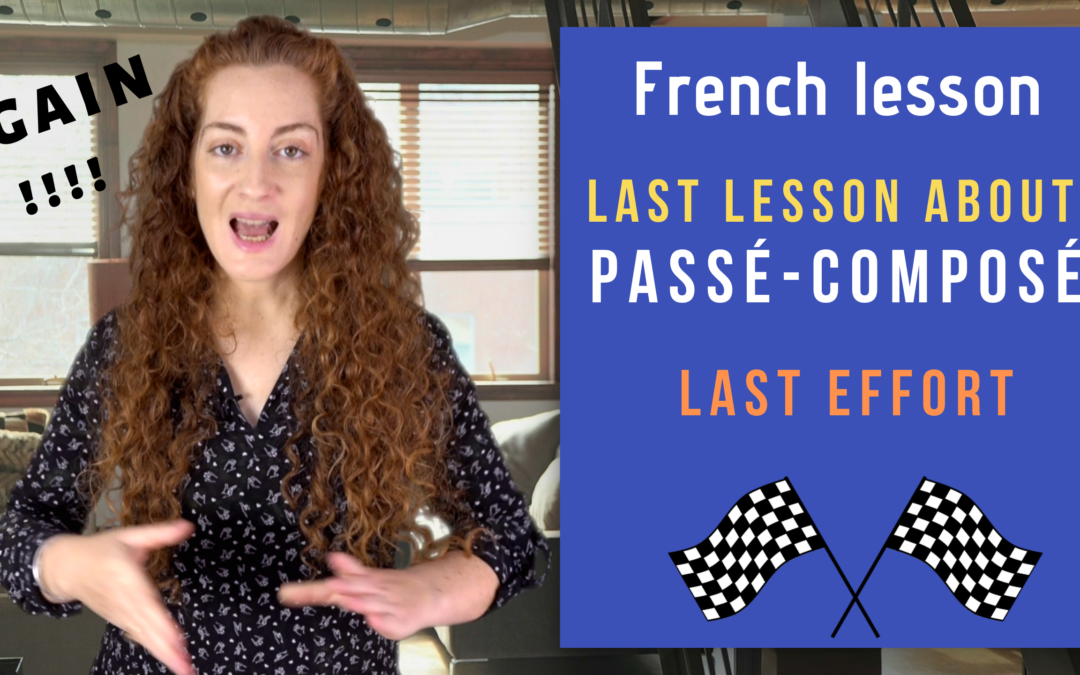
Comme nous l’avons vu dans les vidéos précédentes, il y a des verbes qui utilisent l’auxiliaire être au passé-composé et d’autres l’auxiliaire avoir.
Ça, vous le savez déjà. Maintenant j’aimerais vous parler des cas particuliers :
Il y a des verbes qui utilisent l’auxiliaire être en général et l’auxiliaire avoir dans certains cas !
Dans ma dernière vidéo je vous ai donné la liste des verbes qui se conjuguent avec ETRE :
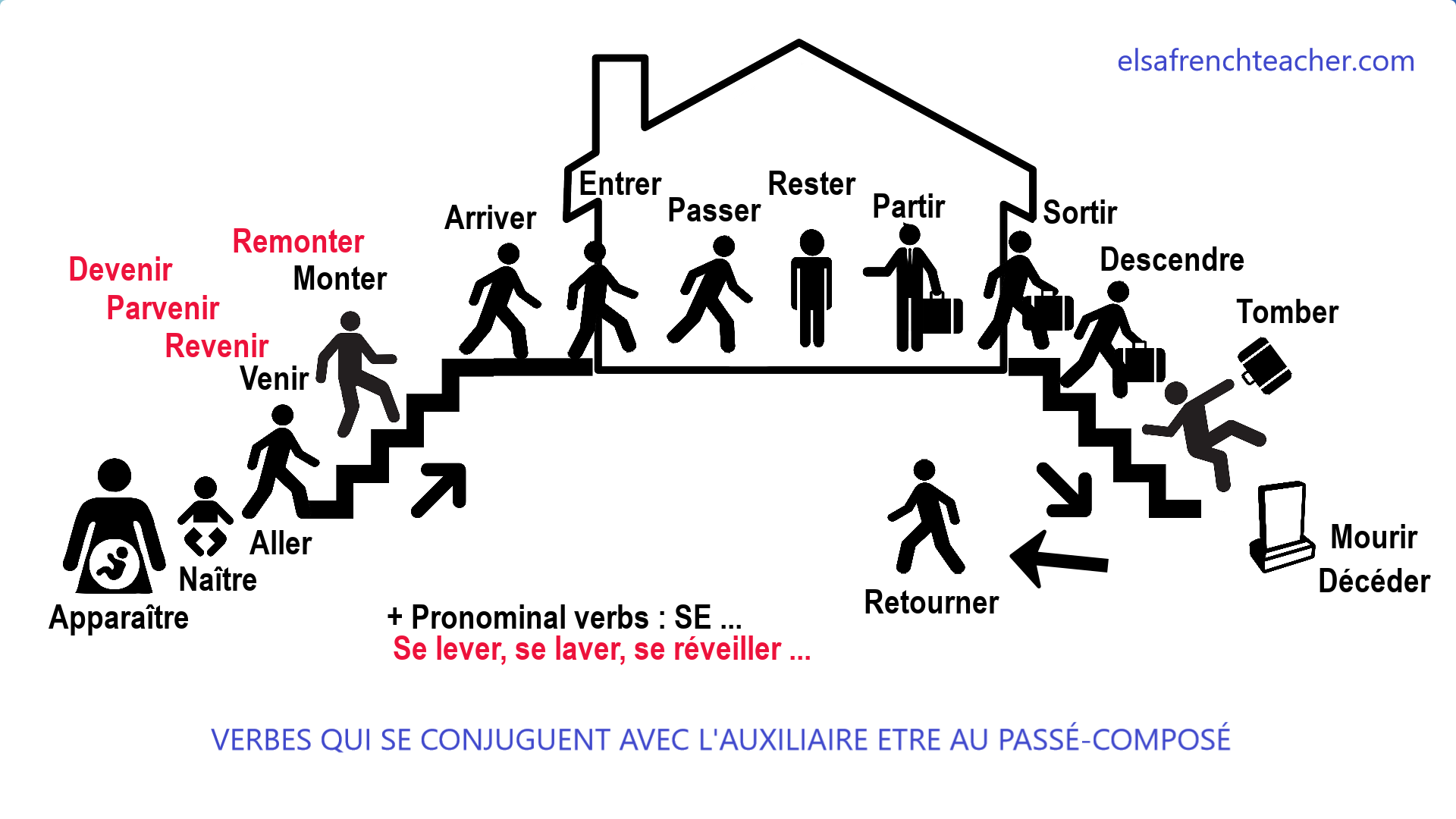
Mais certains d’entre eux utilisent l’auxiliaire être mais aussi l’auxiliaire avoir dans certains cas.
Ce sont ces 6 verbes : monter, descendre, rentrer, passer, sortir, retourner.

Ils prennent l’auxiliaire avoir lorsqu’ils sont suivis d’un COD : complément d’objet direct.
Si vous avez oublié ce qu’est un complément d’objet direct et indirect, voici un exemple.
J’ai donné une pomme à l’enfant.
Le verbe monter s’utilise avec être :
Je suis monté.
Mais, quand on ajoute un objet direct, il prend l’auxiliaire avoir :
J’ai monté l’escalier. J’ai monté les escaliers.
Tu as monté la vieille lampe dans le grenier.
Il a monté l’Everest l’année dernière.
Nous avons monté le meuble très rapidement.
Vous avez monté le son de la télévision.
Elle a monté ce cheval pendant deux ans.
Le verbe rentrer s’utilise avec être :
Je suis rentré hier de mon voyage au Maroc.
Mais, quand on ajoute un objet direct, il prend l’auxiliaire avoir :
J’ai rentré les poubelles.
Tu as rentré ton vélo dans le garage.
Il a rentré le ballon dans le but.
Ils ont rentré leur voiture dans le mur.
Le verbe passer s’utilise avec être :
Je suis passé devant chez toi hier.
Mais, quand on ajoute un objet direct, il prend l’auxiliaire avoir :
J’ai passé un examen très difficile hier.
Tu as passé ton temps à dormir.
Elle a passé l’aspirateur dans le salon.
Vous avez passé une excellente journée.
Le verbe sortir s’utilise avec être :
Elles sont sorties hier soir.
Mais, quand on ajoute un objet direct, il prend l’auxiliaire avoir :
J’ai sorti les poubelles.
Tu as sorti la voiture du garage.
Le magicien a sorti un pigeon de son chapeau.
Il nous a sorti une belle blague au dîner.
Vous avez sorti le chien ce matin ?
L’écrivain a sorti son livre ce matin. Être mis dans les circuits de distribution, de commercialisation
Le verbe descendre s’utilise avec être :
Je suis descendue pour dîner.
Mais, quand on ajoute un objet direct, il prend l’auxiliaire avoir :
J’ai descendu mon sac du grenier.
Tu as descendu Marc à Marseille.
Le cowboy a descendu deux hommes pendant une bagarre.
Le verbe sortir s’utilise avec être :
Elle est retournée à Paris après deux ans passés à Marseille.
Mais, quand on ajoute un objet direct, il prend l’auxiliaire avoir :
J’ai retourné le matelas.
Tu as retourné ta chemise.
Il a retourné la lettre à l’expéditeur.
Les voleurs ont retourné tout l’appartement.
Voilà, j’espère que vous avez compris comment fonctionnent ces 6 verbes au passé-composé.
Vous n’aurez pas cette complexité avec les autres verbes qui, eux, n’acceptent qu’un seul auxiliaire au passé-composé.
Ouf !
—————————————————————————————————————————-
ENGLISH
As we saw in the previous videos, there are verbs that use the auxiliary ETRE in the passé-composé and others the auxiliary AVOIR.
You already know that. Now, I would like to talk to you about special cases:
some verbs use the auxiliary ETRE in general and the auxiliary AVOIR in some cases!
In my last video I gave you the list of verbs that conjugate with ETRE.

But some of them accept both auxiliaries depending on the situation.
Here are the 6 verbs :
Monter,rentrer, passer, sortir, descendre, retourner.

They take the auxiliary AVOIR when they are followed with a direct object.
If you forgot what are direct and indirect objects, I will show you a sentence where there is a direct and indirect object:
J’ai donné une pommeà l’enfant.
> « à l’enfant » is an indirect object because we can say:
I gave an apple TO WHO? J’ai donné une pomme A QUI?
A l’enfant
(there is the preposition “à” before the child)
> « Une pomme » is a direct object because we can say:
I gave WHAT? J’ai donné QUOI?
Une pomme
(there is no preposition before une pomme)
This verb is conjugated with ETRE:
Je suis monté.
I went upstairs.
But, when we add a direct object, we use the auxiliary avoir:
J’ai monté l’escalier. J’ai monté les escaliers. I went up the stairs.
Tu as monté la vieille lampe dans le grenier. You took the old lamp up in the attic.
Il a monté l’Everest l’année dernière. He climbed Everest last year.
Nous avons monté le meuble très rapidement. We assembled the furniture very quickly.
Vous avez monté le son de la télévision. You turned the sound of the TV up.
Elle a monté ce cheval pendant deux ans. She mounted this horse during two years.
You can see the direct object after the verb.
This verb is conjugated with ETRE:
Je suis rentré hier de mon voyage au Maroc.
I returned yesterday from my trip to Morocco.
But, when we add a direct object, we use the auxiliary avoir:
J’ai rentré les poubelles. I took the trash out.
Tu as rentré ton vélo dans le garage. You brought your bike in the garage.
Le chat a rentré ses griffes. The cat withdrawn his claws.
Ils ont rentré leur voiture dans le mur. They crashed their car into the wall.
This verb is conjugated with ETRE:
Je suis passé devant chez toi hier.
I walked past your house yesterday.
But, when we add a direct object, we use the auxiliary avoir:
J’ai passé un examen très difficile hier. I had a very difficult exam yesterday.
Tu as passé ton temps à dormir. You spent your time sleeping.
Elle a passé l’aspirateur dans le salon. She vacuumed in the living room.
Vous avez passé une excellente journée. You had a great day.
This verb is conjugated with ETRE:
Elles sont sorties hier soir. They went out last night
But, when we add a direct object, we use the auxiliary avoir:
J’ai sorti les poubelles. I took the trash out.
Tu as sorti la voiture du garage. You took the car out of the garage.
Le magicien a sorti un pigeon de son chapeau. The magician pulled a pigeon out of his hat.
Il nous a sorti une belle blague au dîner. He gave us a nice joke at dinner.
Vous avez sorti le chien ce matin? Did you take the dog out this morning?
L’écrivain a sorti son livre en février. The writer has released his book in February.
This verb is conjugated with ETRE:
Je suis descendue pour dîner. I went downstairs for dinner.
But, when we add a direct object, we use the auxiliary avoir:
J’ai descendu mon sac du grenier. I took my bag down from the attic.
Tu as descendu Marc à Marseille. You brought Marc down to Marseille.
Le cowboy a descendu deux hommes pendant une bagarre. The cowboy shot two men down during a fight.
This verb is conjugated with ETRE:
Elle est retournée à Paris après deux ans passés à Marseille.
She returned to Paris after two years in Marseille.
But, when we add a direct object, we use the auxiliary avoir:
J’ai retourné les matelas. I turned the mattresses over.
Il a retourné la lettre à l’expéditeur. He returned the letter to the sender.
Les voleurs ont retourné tout l’appartement. The robbers turned the whole apartment upside down.
Voilà, I hope you’ve understood how these 6 verbs work in the passé-composé.
You will not find this complexity with the other verbs, because they only accept one auxiliary in the passé-composé.
[activecampaign form=11]

In the previous video, we have seen that the passé-composé has two auxiliaries: ETRE and AVOIR.
Certain verbs use ETRE, the rest is conjugated with AVOIR.
Ans that after the auxiliairy there is a participe-passé (past particile)
(If you do not understand this, I advise you to watch my previous video, https://elsafrenchteacher.com/french_passe_compose/.)
Today I am going to tell you about something special: the agreement of the participe-passé with the subject according to the auxiliary.
Do not go! I know it sounds very complicated but I will explain it in a very simple way, wait and see.
First of all, when you have the auxiliary AVOIR you can remember that the participle-past does not change.
For example, if you conjugate the verb PRENDRE in the passé-composé, it will be:
J’ai pris le bus.
I took the busTu as pris le train.
Il a pris son vélo.
Nous avons pris l’avion.
Vous avez pris le métro.
Elles ont pris le tram.
You notice that the auxiliary « pris » does not change. It remains the same even if the subject changes. It works like that with the auxiliary AVOIR.
You can imagine that if I tell you this, it is because with the auxiliary ETRE it’s different ?
When we use the auxiliary ETRE, that is to say with certain verbs only (if you do not know what are these verbs watch my previous video) … so with these verbs the participe-passé must agree with the subject!
Par exemple, on écrira :
Il est monté dans le bus
He got on the busElle est montée dans le bus
Ils sont montés dans le bus.
Elles sont montées dans le bus.
This is because we have the auxiliary ETRE, and it’s like that with all the verbs that use this auxiliary.
For example : Elle est descendue du bus et elle s’est promenée dans la ville.
She got off the bus and she walked around the city.
You are going to tell me that it is a detail of the writing because when we speak, we do not hear the difference between « il est descendu » et « elle est descendue. »
That’s right. However, sometimes we hear the difference for some verbs:
Il est mort / elle est morte
He/She diedIl s’est inscrit / elle s’est inscrite
He/She enrolled, registered
We hear a difference in the feminine form because we add an « e » after a consonant so we have to pronounce this consonant.
But this is very rare, so for now you can memorize that this rule is especially useful when you write (and in the passive form but it is another lesson).
Voilà! I hope you have understood the difference in the agreement of the two auxiliaries.
I would like to finish with a rule I did not speak about last time, it is the position of the negation with the passé-composé.
You know that in the present the negation surrounds the verb.
Par exemple : Elle ne prend pas le bus quand elle va au musée.
She does not take the bus when she goes to the museum.
In the past tense, the negation surrounds the auxiliary.
Elle n’a pas pris le train pour aller au musée.
She did not take the train to the museum.
The auxiliary is after the negation.
There is an apostrophe in front of the auxiliary because it starts with a vowel. It’s the same with ETRE.
Elle n’est pas allée au théâtre aujourd’hui.
She did not go to the theater today.
When there is no vowel, there is no apostrophe:
Nous ne sommes pas allés au concert.
We did not go to the concert.
Voilà! The lesson is finished, I hope you enjoyed it!
A bientôt ?
[activecampaign form=11]